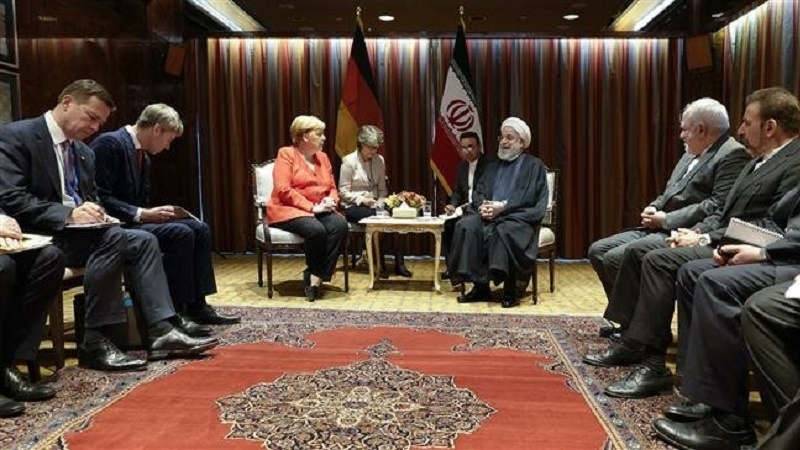Pres. Rouhani rejects E3 statement on Saudi Aramco strikes as 'baseless accusations'
President Hassan Rouhani has roundly dismissed the “unsubstantiated accusations” made by Britain, France and Germany about Tehran’s involvement in the highly disruptive drone attacks on Saudi Aramco petroleum and gas processing plants at Abqaiq and Khurais in the kingdom's Eastern Province.
According to Press TV, during a meeting with German Chancellor Angela Merkel on the sidelines of the 74th session of the UN General Assembly in New York on Tuesday, Rouhani rejected the E3 joint statement as “baseless and unfounded.”
In a joint statement on Monday, French President Emmanuel Macron, British Prime Minister Boris Johnson and Merkel, joined the United States and Saudi Arabia in pinning the blame for the September 14 attacks on Saudi oil facilities, claimed by Yemen's Ansarullah Movement, on Iran.
Rouhani then called on the remaining signatories to the landmark 2015 Iran nuclear deal, officially known as the Joint Comprehensive Plan of Action (JCPOA), to fully abide by their commitments in the wake of the United States’ withdrawal from the accord.
Washington has unleashed the “maximum pressure” campaign against Iran ever since it abandoned the JCPOA on May 8, 2018.
In response to US’s actions, Iran has taken countermeasures, scaling back some of limits set by the JCPOA.
Iran has so far rowed back on its nuclear commitments three times in compliance with articles 26 and 36 of the nuclear deal.
As a third and final step in its reduction of commitments, Iran said on September 7 it had activated 20 IR-4 and 20 IR-6 centrifuges for research and development purposes after the Europeans failed to work within a 60-day deadline to meet Iran’s demands and fulfill their commitments under the multilateral deal.
Iran says its retaliatory measures will be reversible as soon as Europe finds practical ways to shield the mutual trade from the US sanctions, which were re-imposed last year when Trump withdrew from the JCPOA.
European signatories to the JCPOA -- Britain, Germany and France -- have so far failed to uphold their commitments. They have expressed vocal support for the deal, but failed to provide meaningful economic incentives as required under the nuclear agreement.
Merkel, for her part, underlined the need for supporting the Iran nuclear deal and removal of sanctions imposed against the Islamic Republic.
She went on to say that Germany and other European states are determined to quickly put the Instrument in Support of Trade Exchanges (INSTEX) into force.
Britain, France, and Germany announced the establishment of INSTEX in January. The apparatus is expected to circumvent the sanctions that the United States began re-imposing against Iran after leaving the JCPOA.
Germany to study Hormuz Peace Initiative
Merkel further highlighted that Berlin will carefully study Iran’s proposal for regional cooperation to ensure peace in the strategic Strait of Hormuz, dubbed “Hormuz Peace Initiative.”
She said German officials would pore over the initiative, stressing that her country welcomes any bid meant to defuse tensions in West Asia region.
Speaking to government officials before heading to New York, Rouhani said Monday morning that his Hormuz Peace Initiative is designed to include all countries of the region and aims to expand cooperation beyond regional security.
"This plan is about collective work within the Persian Gulf region and we want all countries of the region to partake in it," Rouhani said. "Of course, the plan that will be laid out at the United Nations won't be just about security, but rather economy and other issues, all in line with security matters."
The initiative comes against the backdrop of tensions in the Persian Gulf, where several tankers and commercial vessels have come under suspicious attacks by unknown parties while attempting to cross the strategic Strait of Hormuz.
The United States has blamed the sabotage attacks on Iran, using them as a pretext to build a coalition that would patrol the region.
The US is trying to project the mission as a bid to secure the Persian Gulf, but "the Europeans argue that Washington created the problem in the first place by trying to kill off Iran’s oil exports", the New York Times wrote last month.
Iran has dismissed the allegations and called the attacks false flag operations, warning regional neighbors to watch out for plots by outsiders to destabilize the region.
ME



